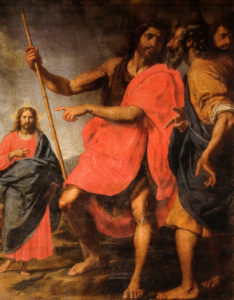Behold the Lamb of God, Ottavio Vannini (1585-c. 1643)
Mount Calvary Church
Eutaw Street and Madison Avenue
Baltimore, Maryland
A Roman Catholic Parish of
The Personal Ordinariate of St. Peter
Anglican Use
Rev. Albert Scharbach, Pastor
Dr. Allen Buskirk, Choirmaster
Midori Ataka, Organist
Epiphany II
Sunday, January 19, 2020
8:00 AM Said Mass
10:00 AM Sung Mass
Brunch to follow in undercroft
__________________
Common
Merbecke
__________________
Organ Prelude
O Morning Star, arranged by Franklin Ritter
Organ Postlude
Variations on ‘Puer Nobis Nascitur,’ arranged by Hal H. Hopson
___________________
Anthems
Behold the Lamb of God, George Fredrick Handel (1685-1759)
Behold the Lamb of God that taketh away the sins of the world.
_________
O sacrum convivium, William Byrd (1540-1623)
O sacrum convivium, in quo Christus sumitur; recolitur memoria passionis ejus; mens impletur gratia; et futurae gloriae nobis pignus datur.
O sacred banquet, wherein Christ is received; the memorial of his passion is renewed; the soul is filled with grace; and a pledge of future glory is given to us.
____________________
Hymns
Lord, whose love through humble service (IN BABILONE). Albert F. Bayly wrote this text in response to a Hymn Society of America search for new hymns on social welfare. It was chosen as the theme hymn for the Second National Conference on the Churches and Social Welfare held in Cleveland, Ohio, 1961. The text begins with recognition of Christ’s ultimate sacrifice on the cross and then points to the continuing needs of the homeless, the hungry, the prisoners, and the mourners. Bayly’s words remind us of modern refugees, and famine victims, and drug addicts who are at our doorstep. The final two stanzas encourage us to move from Sunday worship to weekday service; such integrity in the Christian life is truly a liturgy of sacrifice, pleasing to God. IN BABILONE is a Dutch folk tune.
Draw us in the Spirit’s tether (UNION SEMINARY) was written by the Anglican Percy Dearmer (1867—1936). Jesus has promised that he will be present when we gather in His name, and indeed the purpose of our receiving Him in the Eucharist is to become one body with Him, and our love and service is a sign to the world of His presence. The hymn begins in the Upper Room with the disciples and comes full circle as we join them and the Christians of every age around the table and are nourished by the flesh of God to serve others in the world.
“Tether” is an archaic, albeit felicitous word for “tying” or “joining together.” Stanza 1 reminds us of Christ’s presence (“Where two or three are gathered in my name I am there among them,” Matthew 18: 20); and the haemorrhaging woman’s fervent affirmation (“If I only touch his cloak, I will be made well,” Matthew 9: 20b). Stanzas 2 and 3 paraphrase the ancient Christian Eucharistic rite of gathering, giving thanks, and sharing over the cup and loaf, and sending forth into the world as Christ’s disciples called to render all our meals and living as a sacrament and a means of God’s grace. The hymn begins in the Upper Room with the disciples and comes full circle as we join them and the Christians of every age around the table and are nourished to serve others in the world. UNION SEMINARY was composed by Harold W. Friedell (1905-1959), organist at St. Bartholomew’s and teacher at Union Seminary.
# 545 Hail to the Lord’s Anointed (WOODBIRD) is based on Psalm 72, a Messianic psalm. It was written by James Montgomery (1771-1854). For thirty years he edited a radical paper; in the fears that swept England after the French Revolution he was twice jailed because of his advocacy of social justice. He was an advocate for the end of the slave trade and of the exploitation of child chimney sweeps. The tune WOODBIRD is a German folk melody.
